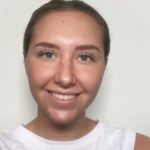
Brianna St John
Indigenous Health Scholarship 2021-2024
University of New England, NSW
Bachelor of Medicine
Scholarship Awarded 2021
Sponsored by:
Keith Henning
How will I contribute to improving Indigenous health as a qualified medical practitioner or health worker?
“Warami” I am Brianna St John, a proud Darug woman from the Burramatta clan. 2020 has been a year we have never seen before bringing hardship – even devastation – to so many with still no end in sight to the coronavirus pandemic. Being involved in medicine as a medical student I have realised how an important service we provide to our wider community. Nursing has been my passion; I finished my degree in two years, where an inspired lecturer saw more in me than I aspired for.I am a resilient and determined woman to be an example to my clan and wider community to succeed as an Indigenous Doctor.
My personal belief is that prevention, education, and empowerment have greater importance than cure. My biggest driving influence was my parents, stemming from my childhood having a dysfunctional family with an alcoholic mother that is so entrapped with her disease and my estranged father with addiction problems with substances. If it wasn’t for how I grew up, then it wouldn’t have led me in the direction I am in today which is mental health which contains a wide range of conditions that affect mood, thinking and behaviour. Rural communities in Australia have an additional set of challenges in terms of relapse prevention and importantly home to Aboriginal and Torres Strait Islander people. While facing challenges in terms of mental health care, rural communities have less access to services than metropolitan areas. A common barrier to relapse prevention in rural communities is fear of stigma, reducing awareness and acceptance of mental illness because it is difficult to maintain privacy in small communities.
With ‘rural stoicism’, stigma makes it likely that they will withdraw rather than seek help from appropriate mental health and support services. Improving community attitudes toward mental illness and encouraging appropriate help-seeking behaviour are priorities in rural communities. I want to be able to give access to mental health and community services and have a positive impact on planning for and providing the support services that are required for preventing relapse. I want to draw special attention to Doctors within rural communities. I want to be able to continue care for people who have experienced a mental illness in rural areas to prevent relapse. I want to be able to shorten wait lists, heighten the rates of bulk-billing and create initiatives to support Doctors working in other rural communities to provide relapse prevention. I also want to be able to have the support of all members of the community as it is paramount for supporting relapse prevention in rural communities and we need to work in close partnership to provide a positive attitude toward and an integrated network of support for those who are vulnerable because they have been affected by mental illness.
I want to play my role to ‘Bridge the Gap in Indigenous Health’. I want to be a part of facilitating better health outcomes. I want to fund more clinics and facilitate a culturally safe empowering environment for Indigenous and Torres Strait Islander people
Current Progressive Report
As I approach the culmination of my medical school journey at the University of New England, reflecting on my final year feels like standing on the edge of a significant transition. This moment is charged with both nostalgia and anticipation, as I prepare to complete my last first semester in the Longitudinal Integrated Clerkship (LIC) Program in Narrabri.
The LIC program has been a transformative experience, offering a unique and deeply immersive approach to medical training. Unlike traditional clerkships, the LIC model has allowed me to follow a diverse panel of patients over time, providing a continuity of care that is both rare and invaluable in medical education. This longitudinal perspective has fostered a more profound understanding of the patient experience, bridging the gap between acute interventions and long-term management.
Narrabri, with its close-knit community and distinct rural setting, has further enriched this experience. The opportunity to work in a regional context has not only broadened my clinical skills but also highlighted the importance of adaptability and resourcefulness in medicine. In a small-town setting, where resources might be more limited, I’ve learned to approach problems with creativity and a team-oriented mindset. The connections I’ve forged with patients and colleagues here have deepened my appreciation for the role of primary care and the impact of personalized, empathetic medical practice.
As I reflect on the past months, I am struck by the personal growth that has accompanied my clinical development. The challenges and triumphs encountered in Narrabri have taught me resilience and flexibility, while the ongoing relationships with patients have reinforced my commitment to compassionate care. Balancing the demands of medical training with the realities of rural practice has been both demanding and rewarding, shaping my approach to medicine in ways I hadn’t anticipated.
Looking forward, I am both excited and apprehensive about transitioning from the structured environment of medical school to the uncharted territory of internship. The skills and insights gained through the LIC program and my experiences in Narrabri will undoubtedly serve as a strong foundation for my future career. As I prepare to leave this chapter behind, I carry with me a renewed sense of purpose and a deepened understanding of what it means to be a physician in a dynamic and ever-evolving field.
In sum, my final year at UNE and the time spent in the LIC program have been pivotal in shaping my medical identity. The lessons learned and the experiences shared will remain with me as I embark on the next phase of my journey, and I am grateful for the opportunity to have grown both personally and professionally in this remarkable setting.